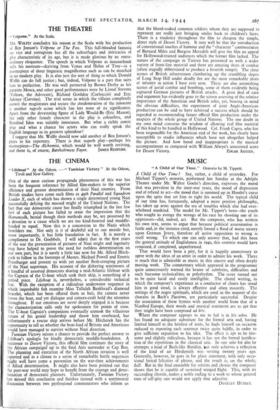THE CINEMA
ONE of the most curious propaganda phenomena of this war has been the frequent reference by Allied film-makers to the superior efficiency and greater determination of their Nazi enemies. From British studios have come such films as 49th Parallel and Squadron Leader X, each of which has shown a single determined young Nazi successfully defying the massed might of the United Nations. The fact that our democratic cause has finally triumphed in the last few feet of each picture has failed to erase the impression that the Herrenvolk, bestial though their methods may be, are possessed by a devotion to a cause which we are too kind-hearted and muddle- headed to equal. Now this is a concession to the Nazis which bewilders me. Not only is it of doubtful aid to our morale but, more importantly, it has little foundation in fact. It is merely a compliment to Dr. Goebbels. I will admit that in the first years of the war the presentation of pictures of Nazi might and ingenuity may have helped to prove the need for ruthless determination on our own part, but it is surely a little late now for Mr. Alfred Hitch- cock to follow in the footsteps of Messrs. Michael Powell and Emeric Pressburger and present us with yet another flesh-creeping picture of the Nazi superman. His account of the dithering sentiments of a handful of assorted democrats sharing a mid-Atlantic lifeboat with the Captain of the U-boat which sank their ship, is something of a period piece. Lifeboat is, nevertheless, a considerable technical feat. With the exception of a ridiculous underwater sequence in which improbable fish examine Miss Tallulah Bankhead's diamond bracelet, which has been offered them as bait, the camera never leaves the boat, and yet dialogue and camera-craft hold the attention throughout. If our emotions are never deeply engaged it is because the characterisation calls only for spokesmen for points of view. The U-boat Captain's companions eventually unmask the villainous nature of his genial leadership and throw him overboard, but unfortunately a rescue ship arrives before Mr. Hitchcock has the opportunity to tell us whether the boat-load of Britons and Americans would have managed to survive without Nazi direction. Tunisian Victory misses a chance to provide the perfect answer to Lifeboat's apologia for kindly democratic muddle-headedness. A successor to Desert Victory, this official film continues the story of the Afriam campaign? up to the final Axis surrender at Cap Bon. The planning and execution of the North African invasion is well reported and as a climax to a series of remarkable battle sequences might well have come a peroration on the war-time achievements of Allied determination. It might also have been pointed out that the post-war world may hope to benefit from the courage and deter- mination of democratic planners. Unfortunately, Tunisian Victory has missed this conclusion and finishes instead with a sentimental discussion between two professional commentators who inform us that the blood-soaked common soldiers whom they are supposed to represent are really just bringing smiles back to children's faces. There is a tendency throughout the film to cheapen the simple, direct style of Desert Victory. It may well be that. the introduction of conventional touches of humour and the " character " commentaries of Bernard Miles and Burgess Meredith will give the film an appeal for Hollywood-trained audiences which the former film lacked. The nature of the campaign in Tunisia has presented us with a wider variety of front-line material and there are amazing shots of combat (often stupidly abbreviated to produce a feverish tempo). The close scenes of British infantrymen clambering up the crumbling slopes of Long Stop Hill under deadly fire are the most remarkable shots of infantry in action I have ever seen. There are also astonishing scenes of aerial combat and bombing, some of them evidently being captured German pictures of British attacks. A great deal of care and argument has evidently gone to the screen assessing of the relative importance of the American and British roles, yet, bearing in mind the obvious difficulties, the experiment of joint Anglo-American production can be said to have achieved a success which should be regarded as recommending future official film production under the auspices of the whole group of United Nations. The one doubt in my own mind concerns the wisdom of allowing real film material of this kind to be handled in Hollywood. Col. Frank Capra, who has been responsible for the American end of the work, has clearly been susceptible to studio influences which have not altogether helped the picture. And how banal and inappropriate is the musical accompaniment as compared with William Alwyn's unassisted score


























 Previous page
Previous page